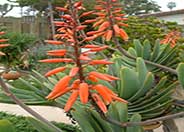
Common name:Fan Aloe
Botanical name:Aloe plicatilis
This wide succulent shrub grows 3'-6' tall and wide, with fan-like clusters of the bluish-gray round tipped leaves. From each fan emerges an open terminal cluster of tubular, orange red flowers in late winter to early spring. Plant in full sun if on the coast or in shade if inland. It is hardy to about 23 degrees F. It needs winter and spring irrigation if grown where does does not receive adequate water from rainfall.
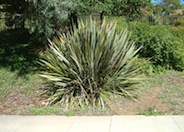
Common name:New Zealand Flax
Botanical name:Phormium tenax
New Zealand Flax is a large, bold plant with stiffly vertical, sword-like, green leaves that arise from its base. It should be grown under full sun for best color. Varieties will offer different growth habits and leaf color.
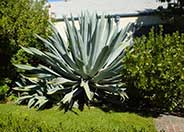
Common name:Century Plant, Maguey
Botanical name:Agave americana
This plant is fast growing to about 6'-10' tall and 8'-13' wide. Wide gray leaves have stiff terminal spines and recurved teeth on margins. It prefers full sun and well-drained situations. After blooming, which could take several years, it will die but will send up new pups from around the base. Some people are allergic to the sap. Removal is difficult if unwanted.
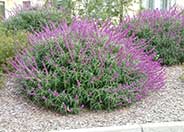
Common name:Mexican Bush Sage, Velvet Sage
Botanical name:Salvia leucantha
The Mexican Sage is a bushy shrub that grows 3'-4' tall and wide. It has hairy white stems, gray green leaves and velvet-like purple flower spikes that bloom summer through fall. This shrub tolerates sun, light shade, little water, and is hardy to 15 degrees F. The Mexican Sage is drought tolerant and attracts hummingbirds. -Cornflower Farms
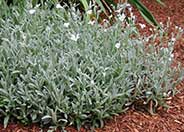
Common name:Snow-In-Summer
Botanical name:Cerastium tomentosum
Masses of snow white flowers highlight this plant during the early summer season.
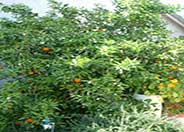
Common name:Sweet Orange cultivars
Botanical name:Citrus sinensis
This tree will grow 20'-30' high and 10'-15' wide; it produces sweet, tasty oranges. It has shiny green, leathery foliage and produces clusters of fragrant white flowers that bloom in the spring.
Designer: Suding Design
Photographer: GardenSoft
Practice grass-cycling by leaving short grass clippings on lawns after mowing, so that nutrients and organic matter are returned to the soil.
Drip and other smart irrigation delivers water directly to roots, allowing no excess water for weeds.